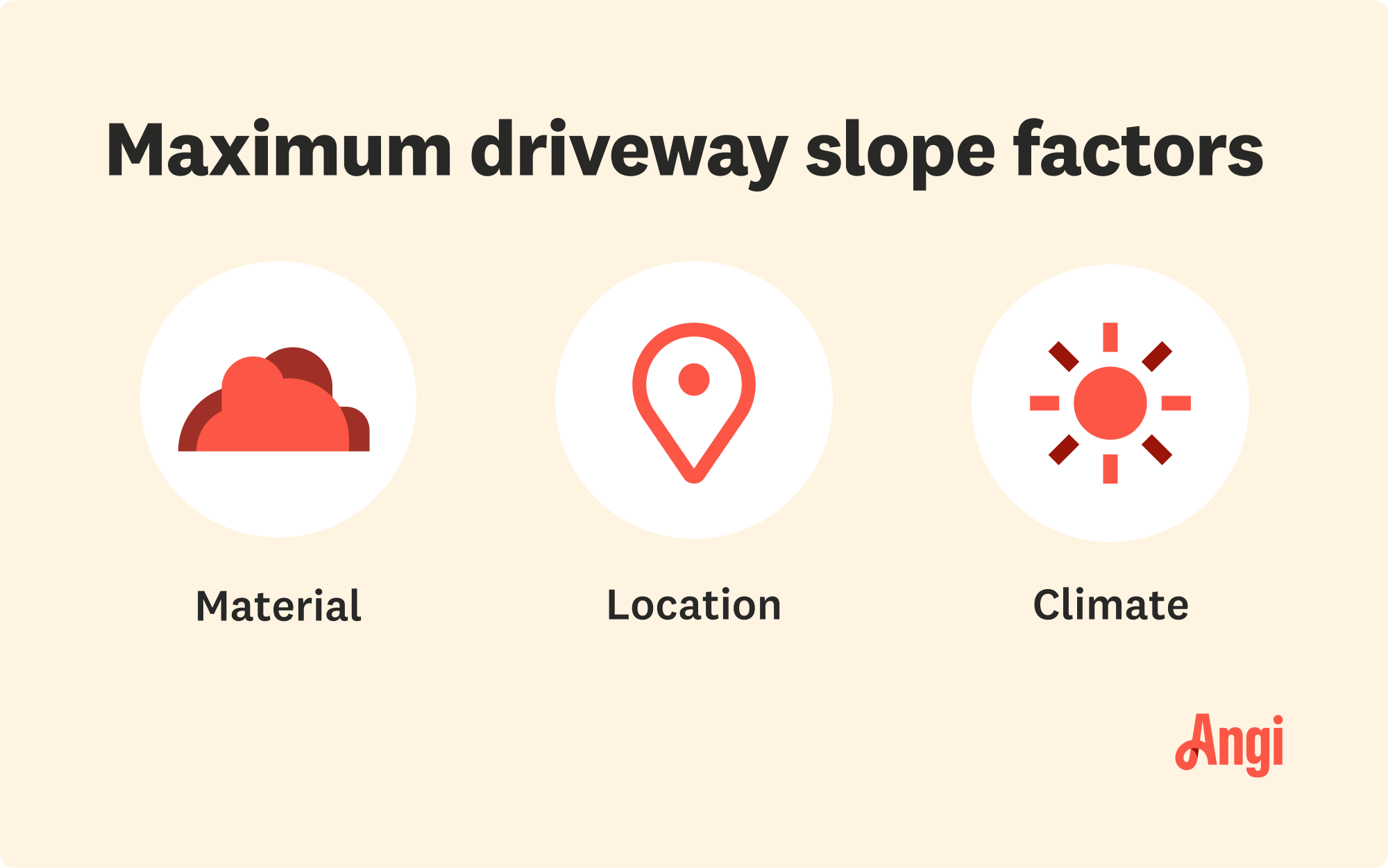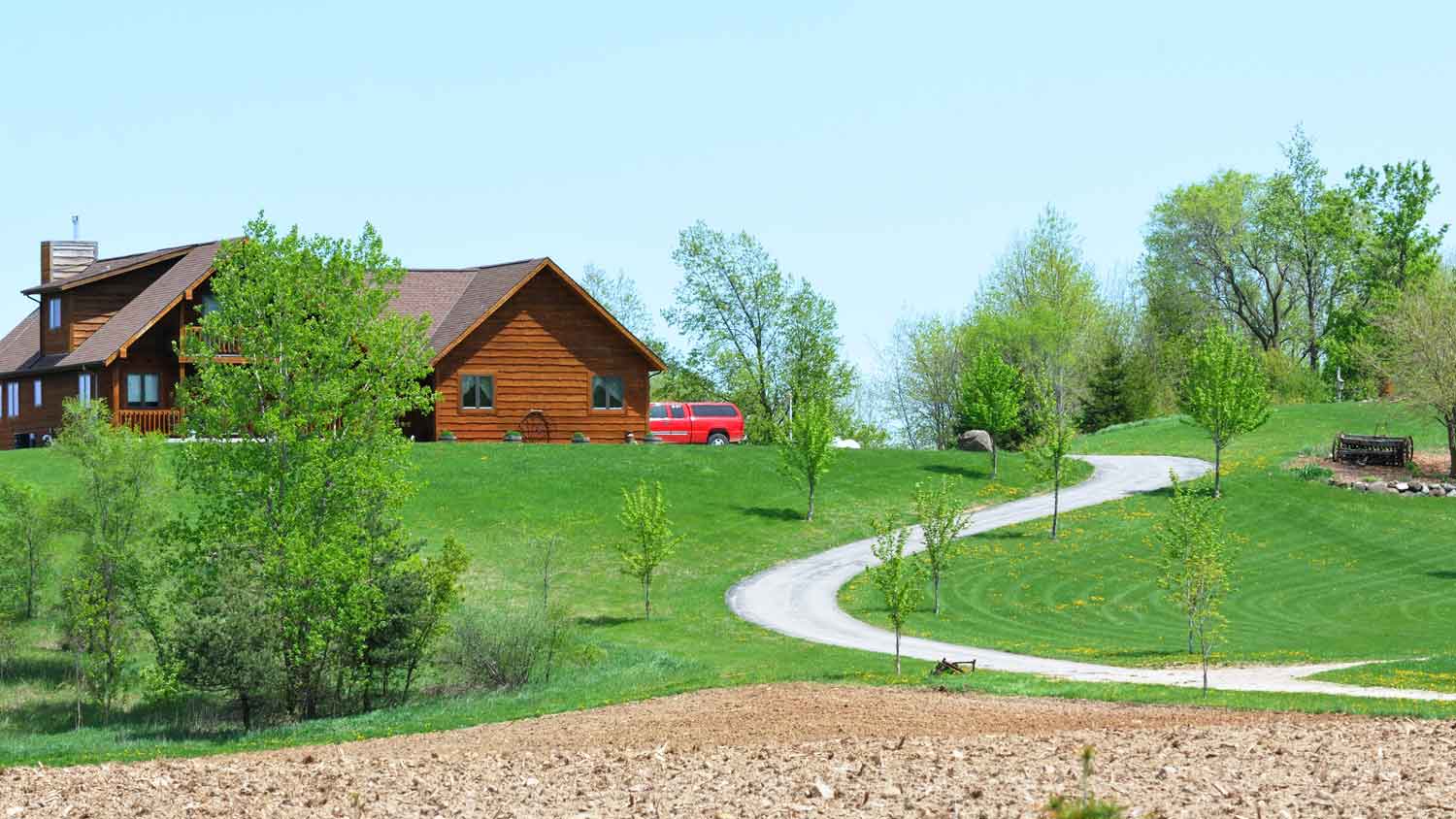
Asphalt driveway repair costs account for everything from hairline cracks to complete overhauls. Learn what to expect from your asphalt repair bill.
Even the steepest hill needs a safe driveway down


The maximum driveway slope is 25%.
Most places have a maximum slope between 10% and 18%.
Any slope above 15% is considered steep.
Look at local requirements to see what your municipality allows.
If you live on a hill, then you may be wondering just how steep your driveway can be before it becomes a problem. But knowing the maximum driveway slope or grade you can have gets a little confusing depending on where you live, local regulations, climate, and more. Let's break down the maximum driveway slope once and for all.
A driveway slope is the percentage that your driveway rises over 100 feet of pavement. For example, if you have a 10-foot rise in elevation per 100 feet, that’s a 10% slope. Your driveway should gradually rise as it goes toward the house, with your home sitting at the highest point.
A driveway slope helps prevent rainwater from collecting around the perimeters of your property during a storm. If you have a negative slope, this can cause structural, foundational, or interior damage to your home.
In some climates, having too steep of a driveway slope can cause your vehicle to slip and slide down the driveway in freezing or rainy weather. That's why most municipalities have their own guidelines to ensure homeowners take safety into consideration. Every region is different, so what applies to one city may not apply to another location.
The maximum driveway slow is 25%, but most places don’t allow for anything over 20%. Generally speaking, a maximum slope for residential driveways is location-dependent and falls somewhere between 10% and 18%, with 15% or higher considered to be a very steep slope.

While it's important to check with your local and state regulations when it comes to your driveway’s maximum slope, you'll still want to be aware of factors that could impact the safety of the driveway's gradient beyond general standards. Here are some of the biggest driving factors:
The type of driveway material you have could impact how well your driveway handles a steeper slope. Surface traction can make the same slope on a sunny, dry day a completely different story after rain or ice. If your area allows for driveways with a slope of 15%, this may be the maximum slope for permeable pavements—not for driveways with impermeable pavements like concrete.
Where you live can mean all the difference between a steep driveway and one that needs local grading services before you can lay pavement. If you don't have a long driveway, then a steep driveway slope may not be possible. There needs to be enough space toward the bottom of the driveway for cars and trucks to exit without damaging the bottom of the vehicles.
Some regions are stricter than others when it comes to driveway slopes. Areas that experience icy weather or frequent storms may have a lower maximum driveway slope to help protect residents from losing traction, whereas arid and mild climate zones may have more wiggle room for steeper driveways.

Safety is the most important factor when it comes to having the right driveway slope. Here are some tips on how to fix your driveway slope for a safer driveway:
Use permeable pavers instead of impermeable pavement for added traction.
Install a ramp at the end of your driveway to avoid undercarriage damage.
Hire a driveway paving company near you to pour resin on the surface of your driveway for extra grip.
Put speed bumps on your driveway to reduce slipping.
Regrade your driveway. The cost to repave a driveway is around $6,800 on average.
Our driveway looks amazing with paverstones done by NY Galaxy General Contracting. The paverstones are expertly set out, and the crew was pleasant and productive. Excellent service!
NY Construction 1 Inc. did an excellent job with our power washing needs. They were professional, efficient, and the results were outstanding. Our driveway and walkways look brand new! We are impressed with their attention to detail and would definitely hire them again in the future.
Professional, courteous and great quality. Would hire the team again.
Flowers Yard Work show up on time to do yard work. I had to run my Mother around so I was not home at the time of work. After returning home my Mother and I noticed weeds in the most exposed area driveway and small area on both sides of driveway. I called Nathan back after a few days and...
We knew our chimney needed repair so, we began getting quotes. Most took a look at the chimney and gave us an estimate to repoint it. Only one actually went up on the roof and, even he only was going to repoint the chimney. We contacted Expert Chimney and asked them to do an inspection and...
Budget was great service. A dead tree fell across my backyard and into my driveway. I called Budget in the afternoon and Bill called back within a couple of hours or less. He came out for a look, gave a very good price and convinced me NOT to do some more expensive items that I though...
The dumpster was in good condition and very clean. He didn't leave any marks in my driveway. The service was perfect; here one day gone the other.
From average costs to expert advice, get all the answers you need to get your job done.

Asphalt driveway repair costs account for everything from hairline cracks to complete overhauls. Learn what to expect from your asphalt repair bill.

Is your driveway totaled? The price of repaving your driveway can save you from repair and resurfacing costs that are no longer worth the investment.

Use our guide to calculate the cost to seal an asphalt driveway. Prices vary based on the type of sealant and the size of the driveway.

This guide to popular types of gravel for driveways will help you evaluate the best gravel material when looking for stability and aesthetic appeal.

Though it seems straightforward, your driveway actually has a lot of parts. From the apron to the trench drain, here are the driveway terms you should know.

Learn how long it takes for asphalt to dry and cure, including the factors that affect the process and tips for ensuring the best results.